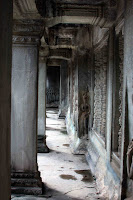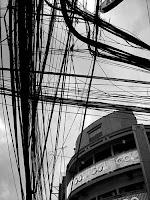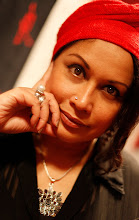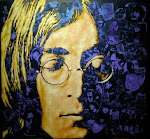 Im Kunthea, his cheerful smile and a 2 litre bottle of water arrived bright and early on the morning we had planned to visit Kampung Phluk. I felt the pores on my head begin to perspire as I tied my hair into a pony tail and greeted him. It amazed me that he never seemed to break a sweat even though he told us that he always wore long sleeved shirts and long trousers. I glanced at Alan - dressed in shorts and a sports singlet. He had only just two minutes before stepped out of our air-conditioned room and was already mopping his face and neck with one of those microfibre gym towels. Nobody sweats like my Alan.
Im Kunthea, his cheerful smile and a 2 litre bottle of water arrived bright and early on the morning we had planned to visit Kampung Phluk. I felt the pores on my head begin to perspire as I tied my hair into a pony tail and greeted him. It amazed me that he never seemed to break a sweat even though he told us that he always wore long sleeved shirts and long trousers. I glanced at Alan - dressed in shorts and a sports singlet. He had only just two minutes before stepped out of our air-conditioned room and was already mopping his face and neck with one of those microfibre gym towels. Nobody sweats like my Alan.We handed Kunthea and Mr Yuteney a Cadbury chocolate block each (careful to caution Mr Yuteney to go slow on consumption as he's a Type 2 Diabetic) and found out that all of us had slept very soundly and enjoyed a filling breakfast. Good old Aussie vegemite on thick toast for us, rice and a side-dish for our Cambodian friends.
“Ready, Maya?” Kunthea asked me.
“Yes, Thea. Let’s go to Kampuuung …” I trailed off the way Kunthea did in his teacher-style way of phrasing sentences.
“Phluk!” he replied, without missing a beat, breaking again into a big smile that revealed his even white teeth.
 The journey to Kampung Phluk is indeed a very pretty one. Again along the way, on both sides of the road for the first fifteen minutes of our tuk-tuk ride, we were sandwiched between waterways. Unfurling their pink tipped petals as they swayed their heads gently in the breeze greeting the sunshine and the traffic – lotus blooms at different intervals shared their sodden dwellings with water lilies and little children. The children beautifully brown from the sun appeared carefree and happy as they squealed in delight catching tadpoles and dragonflies or just splashing around in the water. Out of the past, I heard my grandmother's voice calling, "Juuude, you are going to get hookworms, stop playing in that pokaria (dirty) water! "
The journey to Kampung Phluk is indeed a very pretty one. Again along the way, on both sides of the road for the first fifteen minutes of our tuk-tuk ride, we were sandwiched between waterways. Unfurling their pink tipped petals as they swayed their heads gently in the breeze greeting the sunshine and the traffic – lotus blooms at different intervals shared their sodden dwellings with water lilies and little children. The children beautifully brown from the sun appeared carefree and happy as they squealed in delight catching tadpoles and dragonflies or just splashing around in the water. Out of the past, I heard my grandmother's voice calling, "Juuude, you are going to get hookworms, stop playing in that pokaria (dirty) water! " Mr Yuteney began to signal and then turned right onto a narrow dirt-road. To our delight we were suddenly in a deep shade under tall leafy trees and treated with the company of Khmer-style kampong houses raised on stilts. Pigs, goats, cows and all manner of poultry roamed around freely. “Free range chooks” Alan said to me pointing out to the chickens running across the road. I looked at them and realised they were quite skinny. I wondered if it was due to all the exercise they enjoyed. Even though the road was bumpy, the ride through the kampong was truly a gift of nostalgia and I secretly hoped we would be on it for a while. It reminded me of the days before Singapore had raced ahead of all its South East Asian cousins in its determination to cast off all that it deemed old fashioned only to loose a great deal of its natural charm. We would have encountered hundreds of children, some completely naked running around happily while their older brothers and sisters in school uniforms were leaving for class. Many of them looked at us and waved energetically; the biggest smiles you could imagine on delighted little faces as high pitched voices called out hello after hello.
Mr Yuteney began to signal and then turned right onto a narrow dirt-road. To our delight we were suddenly in a deep shade under tall leafy trees and treated with the company of Khmer-style kampong houses raised on stilts. Pigs, goats, cows and all manner of poultry roamed around freely. “Free range chooks” Alan said to me pointing out to the chickens running across the road. I looked at them and realised they were quite skinny. I wondered if it was due to all the exercise they enjoyed. Even though the road was bumpy, the ride through the kampong was truly a gift of nostalgia and I secretly hoped we would be on it for a while. It reminded me of the days before Singapore had raced ahead of all its South East Asian cousins in its determination to cast off all that it deemed old fashioned only to loose a great deal of its natural charm. We would have encountered hundreds of children, some completely naked running around happily while their older brothers and sisters in school uniforms were leaving for class. Many of them looked at us and waved energetically; the biggest smiles you could imagine on delighted little faces as high pitched voices called out hello after hello. 
After about fifteen minutes of waving and calling out to the children –
 we were told by Mr Yuteney that he could not go any further for the road was in a very bad state due to all the heavy rains – he had been weaving around massive pot-holes filled with muddy water for a good eight minutes. We got out with Kunthea and walked a short distance to where a long boat was waiting for us.
we were told by Mr Yuteney that he could not go any further for the road was in a very bad state due to all the heavy rains – he had been weaving around massive pot-holes filled with muddy water for a good eight minutes. We got out with Kunthea and walked a short distance to where a long boat was waiting for us. Our boatman looked fifteen but he assured us with a large grin that he was seventeen, finished with school and as Kunthea added reassuringly, excellent at his job. Our concern albeit unvoiced was not that he was too young to take us on the long ride to Kampung Phluk but that he probably had to leave school at a young age to help supplement the family income. He held out his hand and helped me on board, he was small but obviously strong.
Our boatman looked fifteen but he assured us with a large grin that he was seventeen, finished with school and as Kunthea added reassuringly, excellent at his job. Our concern albeit unvoiced was not that he was too young to take us on the long ride to Kampung Phluk but that he probably had to leave school at a young age to help supplement the family income. He held out his hand and helped me on board, he was small but obviously strong.  For those of you who have read our entries from 2006 you may remember the comedy of it all; where men and women had to queue separately for tickets. Then to our amusement, finding ourselves with the same men and women pressed against each other from the lack of space, before being herded on board when the ferry arrived. It was so ridiculous and so Indian. On our last crossing, it was pouring with rain while we were trying to catch the second last ferry for the night. The employees at the terminal on the Ernakulam side pushed us together with the other men and women onto an already fully packed ferry. We were exhausted, soaked to our skins and laden with shopping bags slung over our shoulders. I still remember grabbing onto whatever rusty pole or handle I could feel between all the bodies and seeing the look on Alan’s face. We were in the moment and loving it. How we laughed at being sardined like locals on that rusty boat. Nobody complaining, a young man singing a song from a recent Bollywood movie, people smiling at our amusement – the kind of moment I usually take a mental snapshot of, to pull out and indulge in every now and then. Okay, I've indulged. *smile*
For those of you who have read our entries from 2006 you may remember the comedy of it all; where men and women had to queue separately for tickets. Then to our amusement, finding ourselves with the same men and women pressed against each other from the lack of space, before being herded on board when the ferry arrived. It was so ridiculous and so Indian. On our last crossing, it was pouring with rain while we were trying to catch the second last ferry for the night. The employees at the terminal on the Ernakulam side pushed us together with the other men and women onto an already fully packed ferry. We were exhausted, soaked to our skins and laden with shopping bags slung over our shoulders. I still remember grabbing onto whatever rusty pole or handle I could feel between all the bodies and seeing the look on Alan’s face. We were in the moment and loving it. How we laughed at being sardined like locals on that rusty boat. Nobody complaining, a young man singing a song from a recent Bollywood movie, people smiling at our amusement – the kind of moment I usually take a mental snapshot of, to pull out and indulge in every now and then. Okay, I've indulged. *smile*
Suddenly we realised that the boatman had taken us out to what appeared to be at first a vast ocean. It was Tonle Sap Lake. Kunthea told us that at its fullest - it is 135 km long. It was truly magnificent – there was nobody else around, just faraway boats and us bobbing around on ours with its homemade motor parts. I say homemade because it was so obviously put together with odd bits and pieces and a whole lot of imagination. Because the waters in many areas around the fishing villages were shallow at most times of the year, the boatmen had come up with their ingenious tilting of the engine block and extending the propeller to prevent it bottoming out. The boats were built narrow and long to manoeuvre the narrow channels and had garden hose tubes that ran along the inside of the boat acting as water pumps. The steering wheel on our boat had seen a previous life in a Honda automobile ... even in Cambodia, like other Asian countries, Honda is held in high esteem.
We sat there enjoying the view and the cool breeze for a few minutes before Kunthea told our boatman to head to the fishing village. He turned to Alan and me, smiling. Keeping up with the teacher to student prompting “Kampuuuung … ?”
“Phluk!” we replied like good Travelling Children.
This made our 17 year old boatman giggle.

The homes on stilts in Kampung Phluk were eye-catching. Built out of bamboo
 and coconut tree products – many homes were decorated with bold coloured curtains and other soft furnishings. Several had hammocks or swings hanging off their verandas and some obviously ate their meals alfresco as tables with pretty tablecloths graced many of these verandas too. Little sampans filled the waterways between the rows of homes where children played, swam and filled the scene with sounds of laughter. Like the children we had passed in the morning, the hellos and energetic waving began. Splashing around, swimming up to us or just swaying side to side on their verandas trying in their gentle manner to get our attention.
and coconut tree products – many homes were decorated with bold coloured curtains and other soft furnishings. Several had hammocks or swings hanging off their verandas and some obviously ate their meals alfresco as tables with pretty tablecloths graced many of these verandas too. Little sampans filled the waterways between the rows of homes where children played, swam and filled the scene with sounds of laughter. Like the children we had passed in the morning, the hellos and energetic waving began. Splashing around, swimming up to us or just swaying side to side on their verandas trying in their gentle manner to get our attention.

We spent a good length of time in this little kampong having a coffee at one of the homes taking in the sights, sounds and smells while the people went about their daily activities all around us. Later, we visited the fl
 oating temple and primary school. Alan and I found ourselves surrounded the entire time with the village children and loved every single moment. We were impressed with their creativity in finding ways to make toys and floatation devices and most of all, their ability to have fun. At the school many were so tiny, they looked like they were only 3 or 4 years old, and I wondered at what age they started school. The children around us laughed at my questions as I sat on the steps talking to them, the tiny ones were around 6 years in age. The girl who had greeted us when we arrived was exceedingly intelligent and the only one in her family of 8 children to be
oating temple and primary school. Alan and I found ourselves surrounded the entire time with the village children and loved every single moment. We were impressed with their creativity in finding ways to make toys and floatation devices and most of all, their ability to have fun. At the school many were so tiny, they looked like they were only 3 or 4 years old, and I wondered at what age they started school. The children around us laughed at my questions as I sat on the steps talking to them, the tiny ones were around 6 years in age. The girl who had greeted us when we arrived was exceedingly intelligent and the only one in her family of 8 children to be  given the opportunity to have a secondary education. Her day began at 4.30am as she went to high school on the mainland but had chores to do at home before leaving. The reason she was at the primary school that day was that it was her turn to perform duties at the temple. I pictured her each school morning, getting on a boat in the darkness making the long journey. How I admired her. Alan and I were astonished at her knowledge, her decorum and the way the little children looked up to her. She explained to us the reason for the small stature was that they ate mainly rice, vegetables and fish; and they did not take vitamin supplements. But she told me, the
given the opportunity to have a secondary education. Her day began at 4.30am as she went to high school on the mainland but had chores to do at home before leaving. The reason she was at the primary school that day was that it was her turn to perform duties at the temple. I pictured her each school morning, getting on a boat in the darkness making the long journey. How I admired her. Alan and I were astonished at her knowledge, her decorum and the way the little children looked up to her. She explained to us the reason for the small stature was that they ate mainly rice, vegetables and fish; and they did not take vitamin supplements. But she told me, the  reason she was tall and strong was that her family made many sacrifices in order for her to have better food. I realised this young girl was her family’s hope for the future, they knew how gifted she was. Alan and I exchanged glances, knowing that the other was thinking of all the education opportunities the children in Australia have, and take for granted.
reason she was tall and strong was that her family made many sacrifices in order for her to have better food. I realised this young girl was her family’s hope for the future, they knew how gifted she was. Alan and I exchanged glances, knowing that the other was thinking of all the education opportunities the children in Australia have, and take for granted.I hugged her as we got ready to leave. She and some of the other children ran out and jumped onto the other boats that were tied to the pier. I felt my eyes mist as I sent up a prayer for all of them.

What an honour it was for us to have been a part of their lives for those few short hours.




























 A lovely lady from the Cao Dai temple who never for a moment let the smile in her eyes dissappear as she spoke to us.
A lovely lady from the Cao Dai temple who never for a moment let the smile in her eyes dissappear as she spoke to us. This gorgeous little boy waved excitedly as we drove by. I wanted to bring him home with me.
This gorgeous little boy waved excitedly as we drove by. I wanted to bring him home with me.  Waking up each morning knowing a strong and wonderful Vietnamese coffee was on the breakfast menu was a grand way to start the day.
Waking up each morning knowing a strong and wonderful Vietnamese coffee was on the breakfast menu was a grand way to start the day.





















